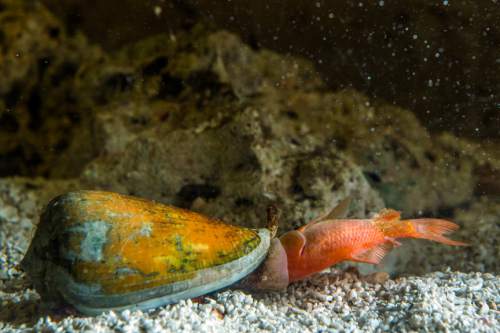This is an archived article that was published on sltrib.com in 2015, and information in the article may be outdated. It is provided only for personal research purposes and may not be reprinted.
The U. S. Army is kicking in some money to help turn a University of Utah discovery about cone snail venom into a non-opioid painkilling drug.
Kineta Inc., the Seattle biotechnology company that licensed the science from the U., won a $1.1 million award this fall from the Army.
U. researchers J. Michael McIntosh and Baldomero Olivera will continue collaborating on the project, and Marcie Fowler of the U.S. Army Institute for Surgical Research in Texas will explore potential for the drug to treat soldiers with burn or neuropathic pain resulting from nerve damage.
While a new drug is still several years away, Kineta President Charles Magness hopes that once it goes into a clinical trials — likely two years away — the government will allow a speedier approval.
"We're trying to move pretty aggressively," Magness said. "This is such a new area and the potential is so important, we might be able to get [it] … expedited through the FDA." The Food and Drug Administration regulates new drugs that companies want to bring to market.
Discovering an alternative to prescription painkillers like Vicodin and Oxycontin is important because of the shortcomings of those drugs. Though they are good for short-term severe pain, they can muddle the mind, affect breathing and are addictive, leading to many accidental overdose deaths every year.
Those addicted to prescription meds often switch to heroin, which is illegal and cheap — and also kills increasing numbers of Americans.
In Utah, 290 people died from opioid overdoses and 119 from heroin overdoses in 2014, according to preliminary data from the Utah Department of Health.
McIntosh and Olivera's research on magician cone snails, which has been underway for decades, already led to the discovery of one painkiller: Prialt, or ziconotide, which went on the market more than a decade ago.
Prialt, now owned by Jazz Pharmaceuticals of Ireland, is used for people with intractable pain, such cancer pain that nothing else can ease. But it has to be injected into the spinal cord, and that limits its use, McIntosh said.
"It works well, but it's always going to have a limited market penetration," he said.
McIntosh, a biology-research professor and director of psychiatry research, was an incoming freshman working in Olivera's lab in the late 1970s when he first identified a particular component of the cone snail's venom that had painkilling properties.
Olivera was interested in the cone snails as a child in the Philippines, where the venomous snails live. The snails aren't harvested to make the drugs; certain components of the venom provide a model for a synthetic drug.
The U. research that Kineta is advancing deals with an entirely different molecule, working by a different mechanism than the one Prialt is based on, Magness said.
A key advantage of the drugs under development is that they wouldn't go into the brain, he said.
Opioids numb receptors in the brain, but these drugs would block the pain signal at the end of the nerve fiber. "You never receive the pain signal in your brain," Magness said.
The safer painkiller could be injected into abdomen fat, for instance, and a small, potent dose would speed relief to the area of the body in pain. "It's a tiny injection that would be no problem to tolerate, and there would be no cognitive impact," Magness said.
McIntosh said some new research indicates that the snail venom compounds may do more than ease the pain. They might also help nerve regeneration so chronic pain does not develop, such as after a car accident, surgery or in battle.
Perhaps, he said, "If we can intervene early on, we can help modify the disease course."
He was a co-author on a 2014 paper by Italian researchers that indicated such a possibility.
"Pain is such a fundamental process, it's hard to effectively take that away without rendering someone unconscious," McIntosh said. "Whether we could ever come up with a medication that eliminates it on a permanent basis is up for grabs, but you might be able to prevent some pain."
Magness said it's too soon to know which kind of pain his company will target with its drug candidate, which it is calling CSP4. It's an analog of the conopeptide RgIA, a small protein extracted from cone snail venom, over the long term.
The Army is interested in burn pain, and the Navy is interested in a nonopioid painkiller for amputations and spinal injuries, he said. Cancer patients on chemotherapy and diabetics with neuropathic pain also need relief, he said.
It's likely a new drug will be effective against more than one kind of pain, however.
If and when a drug hits the market, the U. stands to gain royalties, Magness said.
"What that turns out to be, we can't say precisely because it is a new area," he said.
While the opioid market is huge, many people who need pain relief are not on pain meds, he said. "The market is probably a lot bigger than what is being served today."
Any revenue will be better than what the U. got from Prialt. In that case, the university hadn't patented McIntosh's discovery about the compound from snail venom because it didn't yet have a clear therapeutic use.
Twitter: @KristenMoulton





